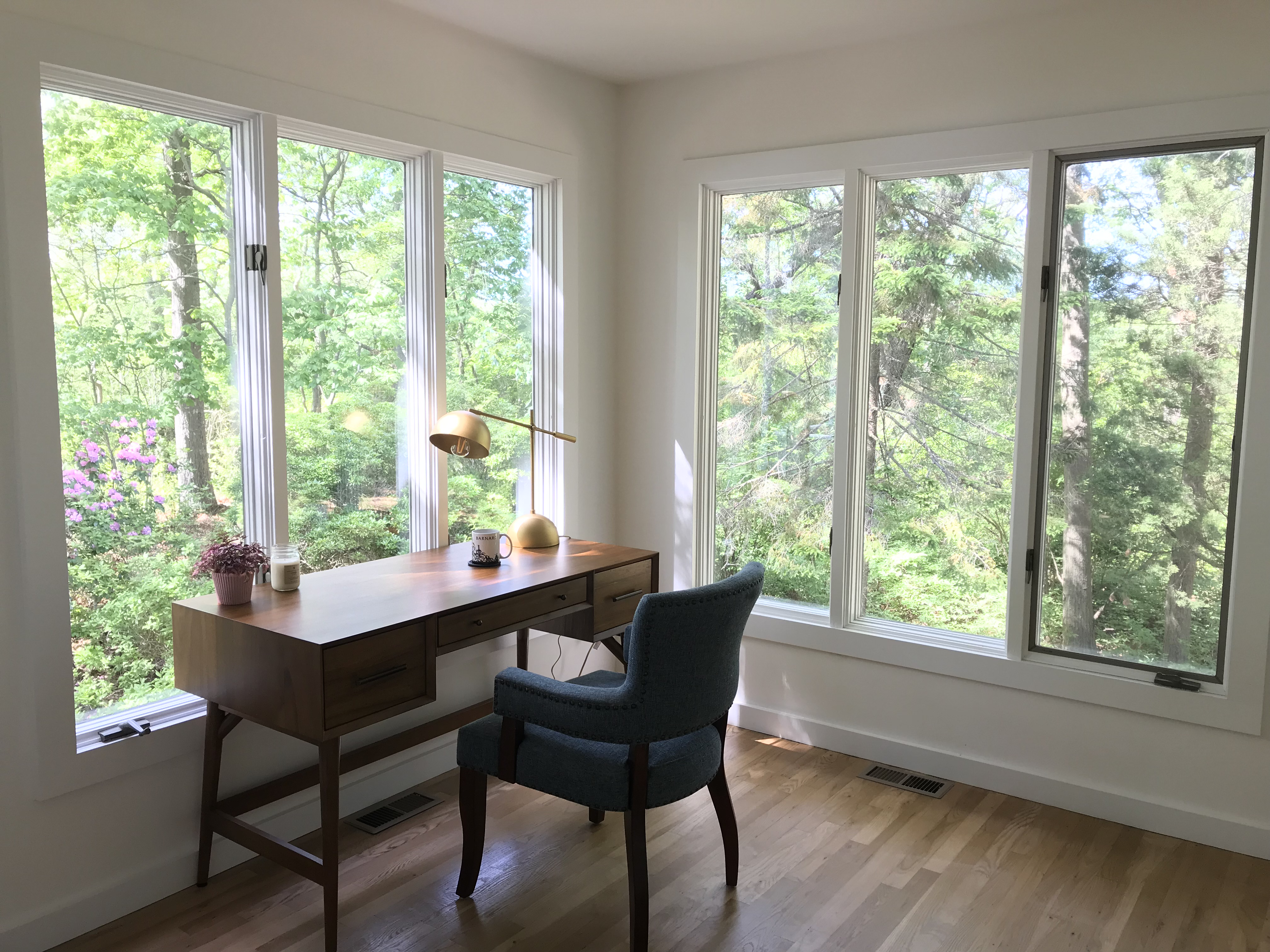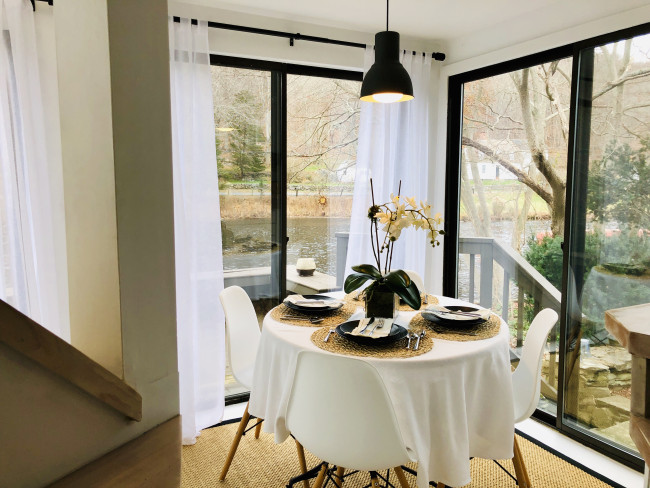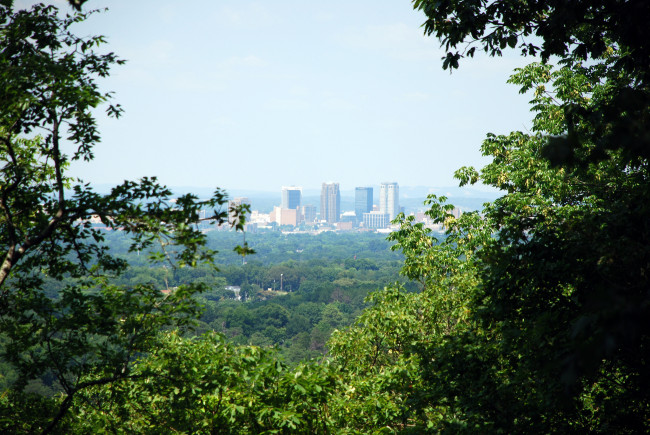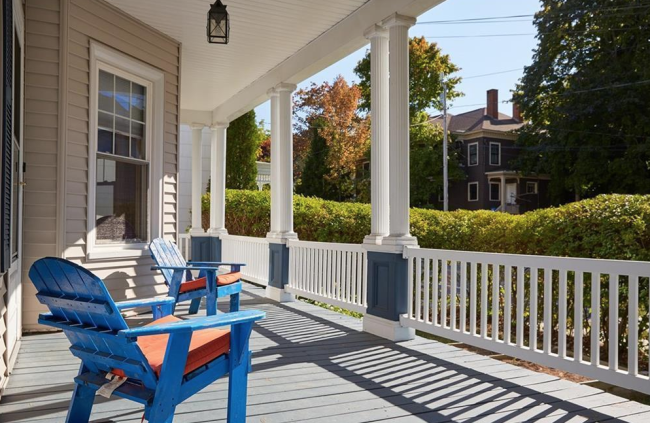One NYer's housing hack: Own a house on a lake in Suffolk County, crash in Bushwick during the week

"We're right on the shores of a beautiful lake—Peconic Lake, also known as Forge Pond—with swans, turtles, herons, and osprey," says Noam Cohen, a New Yorker who works in Manhattan and stays in Bushwick during the week.
Noam Cohen
Anyone who tells you that living in New York City isn’t challenging is lying to you. You need grit and resourcefulness to make it here. One (perhaps extreme) example is Noam Cohen, a 42 year old who works in creative marketing at eBay’s Chelsea office. He and his girlfriend Ashley live in a two-bedroom house surrounded by nature on Lake Peconic in Calverton, New York (near Ashley’s job), which is a two-hour train ride from Penn Station. In order to cut down on commuting time and make his bucolic living situation work, a few nights a week, Cohen crashes in a spare room he rents in a Bushwick apartment that belongs to friends. Here’s how he arrived at this NYC-living hack, the best and worst parts of the arrangement, and the first question New Yorkers tend to ask him about his situation.

My girlfriend Ashley and I lived in an apartment in Ridgewood, Queens, right on the Bushwick border. Literally, the end of our block was in Brooklyn. We lived there for about 18 months. Before that, I lived in a fifth-floor walkup on the Lower East Side for 5 years.
Ashley works in a town called Selden, which is a little over 50 miles from Ridgewood. Before we moved in together, she lived in Forest Hills, which was closer, but traffic still made the commute a real trial some days. When we started looking for an apartment together, her commute was top of mind; we looked for a place where we could have parking in the building that was close enough to the Jackie Robinson. But some days she was still on the road for many hours, so we started thinking about the possibility of getting a place closer to her work.
We knew that living midway between our jobs wasn't what we wanted to do. Neither of us really could see ourselves in the commuter towns of Nassau County, and for Ashley's career, living in Suffolk made more sense. We'd spent a few summer weekends on Fire Island, so we considered Bay Shore (where the ferries leave from) a bit, but we were drawn to the more rural pace of life further east. We'd been to Greenport and loved it, and the North Fork really seemed more our speed. So when push came to shove, we started looking in the Riverhead area: Wading River, Baiting Hollow, Aquebogue.
We had a lot of criteria for the place we wanted, and we weren't in a particular rush, so we took our time to find exactly the right home. I didn't know anyone out here socially yet, so one of my biggest conditions was that it had to be a place where our friends from New York would want to visit us. If it was just a cute, nice home that was a comfortable place for us to live, it wouldn't quite fit that bill.
The first place we saw that we really loved was in the town of Riverhead. It had all these beautiful decorative features, with a gorgeous swimming pool and a chef's kitchen. But someone else made a better offer and we didn't get it. Not too long after that, we saw this house and fell in love.
Truth be told, I had never even heard of Calverton before we saw this place. But we're right on the shores of a beautiful lake—Peconic Lake, also known as Forge Pond—with swans, turtles, herons, and osprey. We have huge old pine trees, maples, sycamores, and dogwoods, and a whole bunch of flowering rhododendron. The house was a total remodel, with a layout that gave us huge open spaces we'd never have imagined as city people. Plus, a truly massive fireplace.
The house was built in the late '60s, and was fully renovated before we first saw it. We were very lucky: A former colleague of Ashley's is a real estate lawyer and his wife is a realtor, and they really made the process smooth and easy for us. It still took a lot longer than I expected for all of the details to get worked out, about five to six months altogether.
The biggest surprise for me, having never purchased real estate before, was the inspection. I didn't realize that if an inspection turns up something that needs fixing, the seller is under no obligation to either fix that thing or lower the price. Your offer is your offer; you can negotiate, or walk away, but the inspection is just to keep you (and the bank! and the insurance!) informed, not something you can demand be addressed.
So, when the inspection uncovered a few small things (an outlet that didn't work, etc.) and one very big thing (the roof needed replacing), they agreed to fix the little details, but the roof was on us.
But in the end, it was an amazing find, and an excellent value. Plus, we closed off one corner of the huge main living area with French doors. It's a beautiful little office space with windows overlooking the lake. It's my favorite room in the house, where I work on the days I get to work from home.
The commute from Calverton to Manhattan would be a lot to undertake every day, so I knew I'd need a not-expensive option to stay in the city some nights. Luckily, we had some overlap between closing on the house and the end of our lease in Ridgewood, so I had a little cushion to find something that worked. Even more luckily, friends had just moved into an apartment in Bushwick and were looking for someone to live in their back room. It's very Bushwick—pressed-tin ceiling, crumbling exposed brick, on a not-particularly quiet block near the J train. My roommates are a married couple, and the situation works out extremely well for all of us.
I've been doing this since the beginning of August, I'm in Bushwick a couple nights a week. I work from home in Calverton when I can, and I'm in Calverton most weekends, unless Ashley and I have plans in the city, in which case she stays with me in Bushwick. I generally go out to the city on LIRR (trains from Riverhead are infrequent, so I usually get a ride with Ashley to the Ronkonkoma station on her way to work) and back on the Hampton Jitney, which has a station right in Calverton.

In a lot of ways I have the best of two worlds. When I am feeling stressed and rushed and cramped by the city, I can go home, where things are slower and there's enough room to really stretch out in. We buy our eggs from a farm that's 12 minutes from our house, and it's so neighborly that it works on the honor system: we just put the money in a slot and take the eggs from a fridge. We're thinking of building a chicken coop and getting some chickens; then the eggs will be right outside. In the summer, there's kayaking on the lake. And it is truly amazing after years of city living not to have to worry about where to store all our stuff.
And when I am feeling a bit understimulated, it's generally time to go back to Brooklyn. I don't get to see my friends in New York as often as I'd like, that's a drawback. They'll come out to visit more when the weather is nicer, but it's still not the same as living in the same place. And obviously paying both rent and a mortgage is a bit of a challenge.
One thing that is a really unexpected result of living out here is how much more connected to—and responsible for—the environment we feel now. The house is in a publicly-protected environmental region, the Long Island Pine Barrens. Our water is from a well, and we're not connected to sewers. So suddenly we had to be very aware of what was going down the drain in our sink, for example. When we wanted to spray in the yard for ticks, or try to keep the deer out of our vegetable garden, we were super cognizant that whatever chemicals we used would flow down into the lake, and into our groundwater.
There are benefits to living on protected land: One day we noticed someone had dumped some old furniture off the side of the road about half a mile from our house; when Ashley reported it online, the response was immediate. Not only did [the town] send someone to remove it, but they said they'd work on developing a way to more closely monitor for such dumping so they wouldn't have to rely on residents in the area reporting it.
We think a lot more about the environment, and the environmental costs of what we do—especially with regard to the watershed and the Bay. This year was apparently a devastating harvest for the locally grown bay scallops, and you can really feel the impact. And likewise, when you get a lot of your produce from local farms (we've been doing a CSA, but we also stop by farm stands regularly), you start to get much more of a sense of the seasons for various produce, what is grown locally and what isn't. So you start to realize the environmental cost of buying, say, a tomato in the middle of the winter, which is clearly flown here from somewhere else. And even for in-season, locally grown vegetables, you become aware of what the appropriate cost should be for something grown responsibly and sustainably; the higher cost of buying organic in the supermarket looks less like a luxury and more like a responsibility—and a privilege.
The actual travel is surprisingly not as difficult as I'd assumed it would be. I take my iPad and catch up on work or on TV (mostly TV).
The one thing I'd do differently: if I had known what this would be like, I wouldn't have gone into it without first buying a car, and factoring that into the cost of this life. On a day I work from home (or if Ashley has the car somewhere on the weekend), I'm pretty much stranded. It's quite rural: it's not really possible to stroll into town from our house.
For some reason, the first question most New Yorkers ask me is whether I have a Costco card now. (Of course I do; Costco is amazing.)
A lot of people in New York express some envy, because they're thinking of it as a country house, like a summer home. But I tell them it's not really like that; I live on Long Island now, and just rent a room in Brooklyn. Then they mostly just say "all that time on the road. I could never do that." And maybe if I was driving myself, I'd agree. As it stands, it doesn't feel like a strain at all.
You Might Also Like



























